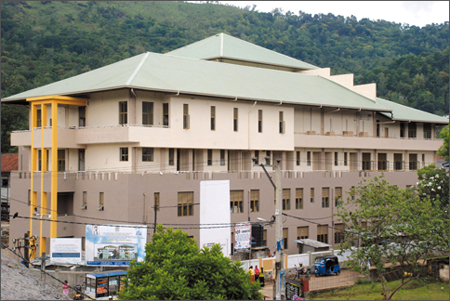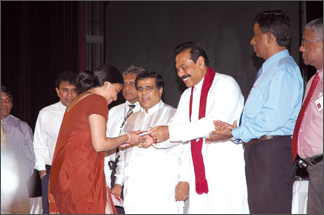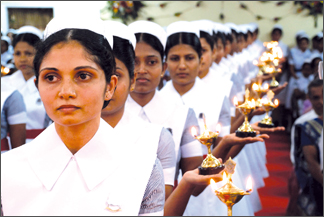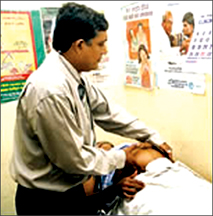Vast strides in health sector
by Jaliya WIJEYEKOON
|

The recently commissioned General Hospital in Badulla
|
It is an accepted fact that the future of a nation mainly depends on
the sound health experienced and enjoyed by the people of the country,
irrespective of differences. Sri Lanka which has a recorded history of
over 2,500 years had been a healthy nation from time immemorial.
However, according to the annals of history there had been very
effective indigenous treatment, native methods and means of curing
patients for different ailments from our primitive days.
With the affluxion of time Sri Lanka was invaded by various foreign
powers and finally we became a colony of the British empire in 1815. A
far-reaching changes took place in our social structure with the advent
of British rule and one of the vital areas that had been affected was
the health sector.
The white rulers totally neglected the indigenous or Ayurvedic
medicine and introduced western treatment and methods.
We won independence after a long period of time and a separate
ministry was set up to look after the health needs of the nation from
the very first Parliament. A substantial percentage of the annual budget
is allocated for healthcare services of the nation, irrespective of the
party in power since independence. Hospitals which were set up all over
the island mainly in urban areas to cater to the needs of the people
have been functioning for a long time and facilities were provided by
successive governments.
These hospitals were equipped with laboratories, operation theatres
and various other facilities including human resources.
|

President handing over the letter of appointment to a newly
passed out doctor |
However, during the past three decades, due to the population
explosion in the country and also with the rapid social changes
healthcare services of the country were at a low ebb mainly due to the
financial constraints suffered by the government due to the protracted
war.
New vision
It is encouraging to note that the present government formulated a
mechanism to look in to the healthcare services of the nation based on
four main areas or categories such as National Hospitals, Human Resource
Development, Public Health of IDPs and Estate and Rural Hospitals.
National Hospitals
All National hospitals have been provided with ultra-modern equipment
to cater to the needs of the patients. New hospital buildings have been
constructed, hospitals have been repaired and refurbished, new wards
have been added and all laboratory and theatre facilities have been
expanded spending massive amounts of funds. After Minister Nimal
Siripala de Silva took over as Chairman of the WHO, he negotiated with
International organisations and obtained the ultra modern medical
equipment running to billions of rupees to provide better healthcare
facilities to the public. The improvements to these national hospitals
were of immense benefit to needy people.
Human Resource Development
|

Director National Hospital Dr. Hector Weerasinghe enlightens the
Health Minister Nimal Siripala de Silva on the newly added MRI
scanner at the General Hospital Colombo.

A batch of newly trained nightingales take their oaths |
Another significant area that the government has identified to
improve is the Human Resource Development in the health sector. During
the past four year period the government took measures to train 5560
doctors and post them to various parts of the island. Seven thousand
eight hundred and forty one nurses have already completed their
three-year training period of the 15,000 and they have been appointed to
hospitals all over the island. Apart from the doctors and nurses,
recruitments had been effected to service personnel for the smooth
functioning of hospitals, medical centres and dispensaries.
A large number of scholarships has been obtained from International
organisations on a regular basis during the past four years for doctors
to further their qualifications in their fields of specialisation.
New courses have been introduced at Nurses training centres to cater
to the needs of the hospitals.
The health of Internally Displaced Persons (IDPs) was a daunting task
faced by the present government. On account of the humanitarian
operations which were carried out even before the end of war in Vavuniya,
(Chettikulam) a substantial slice of the Health Ministry budget was
allocated. Newly recruited Doctors and nurses have been posted to IDP
camps and hospitals, rural hospitals, medical centres, dispensaries and
residential quarters for staff members have been provided with the basic
facilities in addition to the drugs, medicine and other equipment.
Donations from various international organisations such as
ambulances, theatre equipment and medical supplies were despatched to
IDP camps for the use of the civilians.
Estates and rural hospitals
Another vital area that the Health Ministry has focused its attention
is the estate sector and rural hospitals all over the island.
Estate hospitals were in a deplorable condition in the past and one
of the main pleas of the estate community was to look into their
healthcare problems.
In keeping with the Mahinda Chinthana the Ministry has taken every
effort to re-establish health facilities of estate workers and all
estate and rural hospitals have been improved and provided with medical
facilities and human resources to render a better service to down
trodden estate workers and rural folk.
Ayurvedic Hospitals
|

A gynaecologist examining a patient |
Ayurvedic hospitals have received unprecedented support for its
growth during the past four years.
Ayurvedic treatment or indigenous medicine methods which prevailed in
the country from time immemorial had been neglected for a long time and
no state patronage was focused for its development or even for its mere
survival until very recently.
It is commendable how the present government and Minister Nimal
Siripala de Silva has virtually resuscitated this all important segment
of the national health sector by providing infrastructure facilities
such as new hospital buildings, equipment and human resources and all
other related amenities amidst severe financial constraints experienced
by the country owing to the protracted war.
A number of Ayurvedic doctors has been recruited and steps have been
taken to provide them similar facilities enjoyed by MBBS qualified
doctors.
According to UNICEF and the World Health Organisation the health
standard of Sri Lankans better than any other country in South Asia.
Sri Lanka has achieved a relatively high standard of health as seen
by the low levels of infant, child and maternal mortality and high life
expectancy.
In Sri Lanka UNICEF supports quality health and nutrition services
including immunisation, emergency obstetric care and neonatal care,
provision of medical supplies, support to mobile clinics, promotion of
infant and young child feeding micronutrient supplementation and
nutrition rehabilitation of severely undernourished children.Under the
guidance of Minister Nimal Siripala de Silva the health sector of Sri
Lanka has achieved great strides.
The Ministry has spent Rs. 5,000 million during the past four years
on buildings and millions of rupees are being spent annually on human
resource development to provide better healthcare facilities. |

